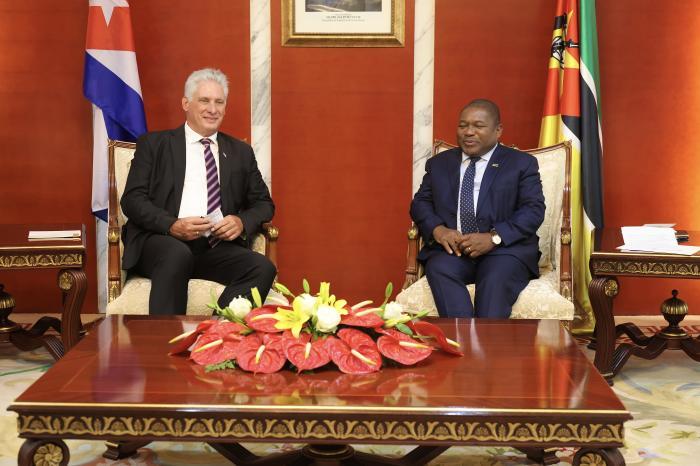According to the Cuban Presidency’s Twitter account, Mozambican President Filipe Jacinto Nyusi saw Díaz-Canel off at Maputo International Airport.
“We appreciate the shows of solidarity and Mozambique’s position against the blockade and Cuba’s unjust inclusion on the State Sponsors of Terrorism list,” the Cuban president tweeted.
He added that he leaves this African country committed to remaining united by the brotherhood bequeathed by the historic leader of the Cuban Revolution, Fidel Castro, and the first Mozambican President, Samora Machel.
Díaz-Canel also extended a fraternal hug to the Cuba solidarity movement, the Cuban collaborators, and Cuban residents here, to whom he expressed his gratitude for their welcome.
Shortly before his departure, the Cuban head of State held a cordial meeting with representatives of those groups, in which the support and recognition of the creative and heroic resistance of the Cuban people prevailed.
Diaz-Canel arrived in Mozambique on Friday on an official visit and met with Filipe Jacinto Nyusi.
After the meeting, Díaz-Canel went to the Heroes’ Square, in the city of Maputo, where he laid a wreath on behalf of the Cuban people in homage to those who led the independence process in Mozambique and the construction of the new country after the liberation was achieved.
Later, he visited to the Marcelino dos Santos clinic, a center that recalls one of the founders of the Mozambique Liberation Front (Frelimo), and where both countries carry out a project for specialized care for people with diabetes, which will soon begin to provide services.
Accompanied by President Filipe Jacinto Nyusi, the Cuban head of State learned that several of the experts who will work there are Cuban collaborators and others were trained in Cuba.
There, experiences from Cuba’s National Healthcare System associated with the treatment of diabetes will be put into practice, including the use of the Cuban drug Herberprot-P, which is used to treat diabetic foot ulcers.
jg/iff/mem/kmg










